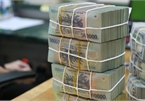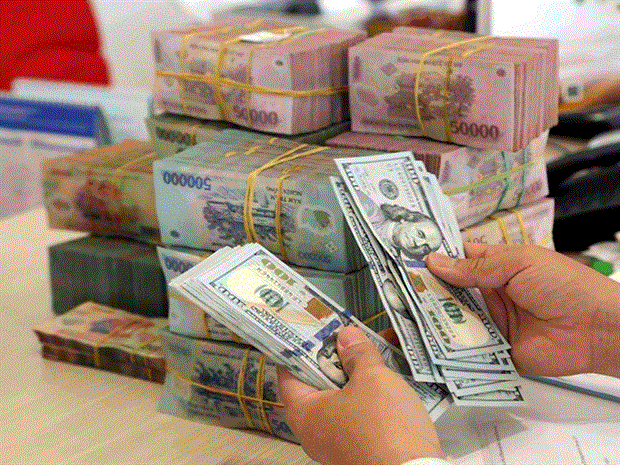 |
| A State Bank of Vietnam branch in Hanoi. — Photo sbv.gov.vn |
The State Bank of Vietnam (SBV) on October 30 set its exchange rate between the dong and the US dollar at VND23,201 per dollar, up 0.2 per cent year-to-date, while the exchange rate on the free market rose at a similar pace.
The dong has been strongly supported by the higher trade surplus and foreign reserves, VNDirect said.
Vietnam’s exports increased by 4.7 per cent year on year in January-October despite the tightening of global trade amid the COVID-19 pandemic, while imports rose at a slower pace of 0.6 per cent on-year.
The rapid increase of exports and slow gain of imports made the 10-month trade surplus double last year’s number to US$18.7 billion.
The country’s reserves rose to US$92 billion in late August from around $80 billion at the end of last year. The figure is expected to reach $100 billion at the end of this year, according to the SBV.
The expansion of foreign reserves “should be supportive of the Vietnamese dong” and the local currency should “remain stable at current level towards the end of 2020,” VNDirect said.
“The VND may move within the range of 0.5 per cent on either side,” VNDirect forecast, adding there will be more upside risks for the dong in 2021.
Among high upside risks that could affect the Vietnamese dong in 2021 are central banks’ money easing policies and the appreciation of the Chinese yuan, the company said.
With the Federal Reserve planning to keep its interest rates near zero per cent until at least 2023 and allow a period of higher inflation, the US dollar should remain weak in 2021, the brokerage said.
The Chinese yuan is projected to stay strong because the world’s second-largest economy would continue to outperform others in 2021 and its trade surplus would widen, VNDirect said.
In addition, the strong recovery of the Vietnamese economy amid the COVID-19 pandemic would also be a factor that may boost the value of the dong on global markets, VNDirect said.
A double-edged sword
A stronger Vietnamese dong would encourage foreign capital to flow into Vietnam, ease Vietnam’s dollar-denominated debt payment burdens, and temper the arguments over trade imbalance and currency manipulation with the US, VNDirect said.
In the first 10 months of the year, foreign direct investment (FDI) flowing into Vietnam slowed down amid the COVID-19 pandemic.
According to the General Statistics Office, the disbursed capital of FDI projects in January-October slid 2.5 per cent on-year to $15.8 billion and registered capital of FDI projects dropped 19.4 per cent on-year to $23.5 billion.
In terms of foreign indirect investment (FII), foreign investors net-sold a total of $560 million worth of Vietnamese shares and assets in 10 months.
But in the future, the global economic and business environment may improve as the coronavirus spread has been contained well in some countries, such as Vietnam.
Vietnam would see the huge inflow of foreign capital in 2021 thanks to positive economic growth prospects and the relocation of manufacturing facilities from China due to the US-China trade war, VNDirect said.
“On the negative side, the strengthening of the VND will slightly soften the competitiveness of Vietnamese exports, especially agriculture products, raw materials and unprocessed goods,” the company said.
But if the Chinese yuan keeps growing stronger, the burden could be offset, VNDirect said.
“In addition, the strengthening of the VND could make imported goods cheaper, thereby stimulating local consumer demand for imported goods and causing the trade surplus to shrink.” VNS

Stable outlook expected for Vietnamese dong
While Vietnam is at risk of being listed as currency manipulator by the US, such a risk appears low, as the US will likely continue to reduce its dependence on Chinese exports by reorganizing its supply chain with other partners.

Vietnam’s forex reserve sets new record
Vietnam’s foreign exchange reserve has hit a new record high of 92 billion USD, a significant expansion from 84 billion USD which Governor of the State Bank of Vietnam Le Minh Hung revealed in April.